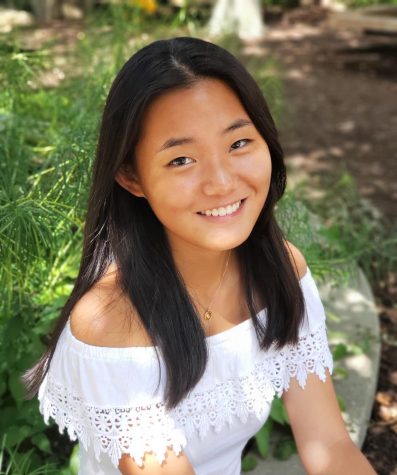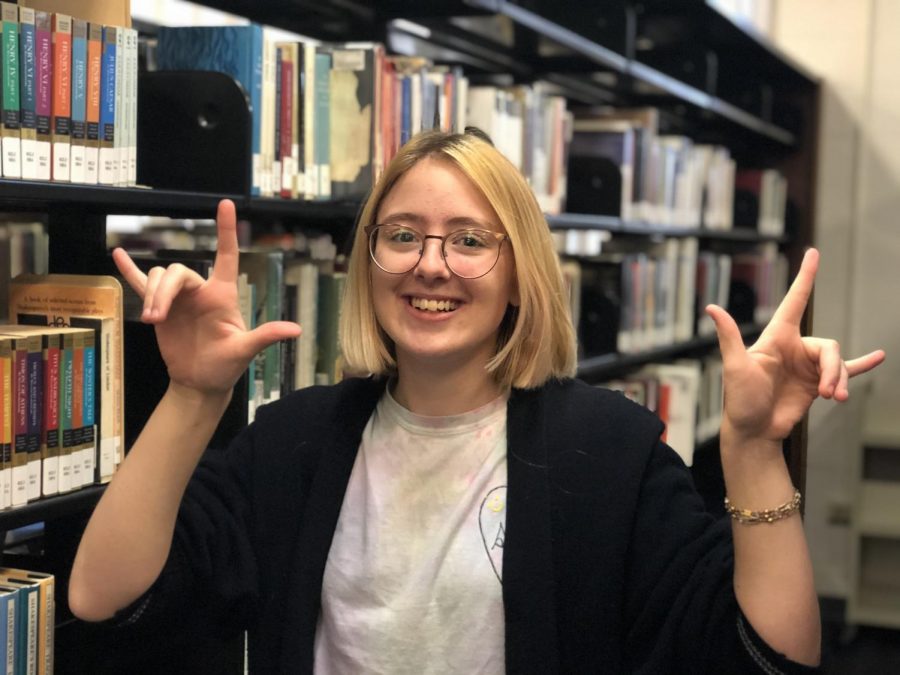Pretty handy
Meet the senior who plans to pursue a future in ASL
Photo by Caroline Sun
Cassidy Cwiertnia, senior, makes the gesture for “love” in ASL. For her, sign language is not just a hobby, but a passion that she hopes to pursue in the future.
Speech. It’s the number one method of face-to-face communication. You walk through the halls, and you’re assailed by it from all different directions: students greeting their friends, chattering about grades, exclaiming about weekend plans. But what if, by some chance occurrence, speech stopped being an option for you?
For Cassidy Cwiertnia, senior, such a circumstance would not be a problem. After first learning American Sign Language (ASL) in sixth grade in order to talk to her friends across the classroom, Cwiertnia has since fallen in love with the language.
“If I had the option, I would speak ASL all the time,” Cwiertnia said, “Nonverbal communication is a huge part of my life right now, and it has been for a long time. I communicate every day, and if you talk to any of my friends, they would say that all I ever do is talk and if I didn’t have the ability to talk, you’d take away a huge part of my personality. So to have met people that don’t have that ability to communicate in the way that we do, it makes me empathize with them.”
For Cwiertnia, her main fascination with ASL lies within the language’s ability to communicate across non-verbal borders. Although she loves the language for its expressiveness, “in a way that normal English isn’t” because of the fluctuation in one’s voice that is replaced by usage of facial muscles, hands, stance, and eyes, Cwiertnia says she is most intrigued with what she can do with ASL in her everyday life.
“As I started to learn [more about ASL], I realized that Lake Zurich has a huge deaf population, like we have over 50 people in the LZ area alone that are hard of hearing, if not completely deaf,” Cwiertnia said. “And the ability to talk to them is so special. It’s like learning German in school. Once you learn it, you just need somebody who speaks German and who you can talk to in that language. I crave that.”
While many people first learn ASL because they know someone who is deaf, Cwiertnia says that her closest connection to the deaf community is through a friend with hearing aids. However, as a “deaf heart,” Cwiertnia says that she is “in the deep deep end of [the community]” and this can be seen in the many ways she has integrated the language into her everyday life.
“Whenever I talk, I speak a lot of quick easy sign I while I talk, because I’m so used to it at home with my mom,” Cwiertnia said. “My mom has been learning [ASL] with me and I’ve taught it to my cousins, I’ve taught it to my grandparents, I’ve taught it to anybody I can get my hands on. I’m just so used to signing around the house and so used to signing in my life that when I start talking, my hands start moving, and I don’t even think about it anymore.”
But for Cwiertnia, ASL is not just a hobby; it is a passion that she hopes to delve further into in the next few years.
“I want to be an interpreter so badly,” Cwiertnia said. “In college, my major is going to be American Sign Language interpretation and translation with a double minor in cued American English and Braille translation. I want to spend my life making sure other people can talk the way I do, and interpretation is definitely the way to do that. I think I want to work in hospitals or go and do something political where like, I would get up on a stage with the President. I want to go where my ASL takes me because it’ll take you everywhere.”
Cwiertnia’s desire to pursue her love for ASL was further cemented this summer when she spent two and a half weeks at a college in Springfield for a cued camp, where she taught and learned more ASL.
“I met a boy my age named Max, who is completely deaf, and he was from Colorado,” Cwiertnia said, “and talking to him was my first interaction with a regional dialect. He spent the entire two weeks teaching me how to say the word soda pop. And after speaking to him and his mom for two weeks, I just had an aha moment. Like, the light bulb went on and I went, ‘Oh my god, this is what I’m going to do.”
While the study of ASL is a personal pursuit for Cwiertnia, it is also directly connected to her wholehearted belief in the importance of communication, for all.
“Everybody talks every day, and if you took away their ability to communicate, it would be so different,” Cwiertnia said. “ I’ve watched people who can’t hear, who can’t speak, who can’t see, and to be able to give them [the abilities we have] makes them feel normal, makes them feel active in taking control of their own lives. Everybody deserves to put a thought out there, everybody could change the world with what they’re saying. So I just want to give people the ability to change the world in the way they think they can change the world. I want to give them the ability to communicate.”

As a senior, Caroline's back for her third year as Digital EIC. If you ever catch her outside of school, she'll probably be running with the cross country...


